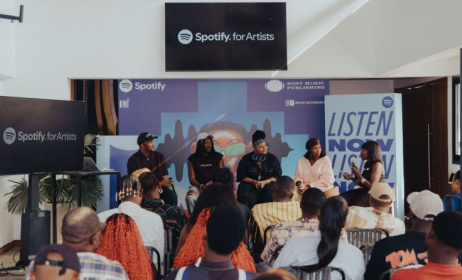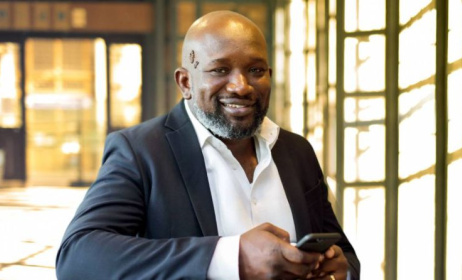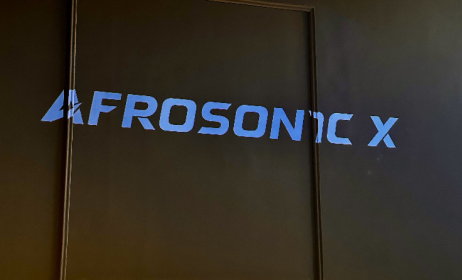Music in the Ghanaian media
By Arnie Baidoo
After the upheaval of Ghana’s military regime, the country’s media stands, arguably, as one of Africa’s most unrestricted. This is thanks to the 1992 Ghana Constitution (Chapter 12), which guarantees freedom of press, and media independence. Further, in 2000 President John Agyekum Kufuor repealed the criminal libel law.
 Newspapers in Ghana. Photo: Starrfmonline
Newspapers in Ghana. Photo: Starrfmonline
The 2011 press freedom report by Freedom House ranked the media in Ghana as "free". Only four other countries in Africa received that ranking. This text provides an overview of the media in Ghana, traditional forms as well as online media, particularly as it relates to the local music industry.
Radio
Radio broadcast commenced in 1988, where the government-owned Ghana Broadcasting Corporation enjoyed such monopoly, with international broadcast via some foreign radio stations including Voice of America, Radio France International and BBC broadcasts on 101.3FM. 1995 marked the privatization of the airwaves and the proliferation of radio stations across the country and presently, there are close to 200 radio stations splattered across the 10 regions of the country.
Most of the radio stations have the same pattern of a mixture of talk, news and music and more than 50% of the stations transmit in various local dialects of the country. Very few play music fully or do more music than talk and examples are the Accra-based Atlantis Radio 87.9FM and Radio VOM 107.5FM.
The following are some of the many stations that adopt a programming of talk and news but are also highly-recognized for music. Accra-based stations include Joy FM 99.7FM, Citi FM 97.3FM, Live 91.9FM, Starr FM 103.5, Peace 104.3FM, YFM 107.9FM and Hitz FM 103.9FM. In Kumasi there is Luv FM 99.5FM, Skyy Power Radio 93.5FM in Takoradi and A1 Radio in Bolgatanga.
Atlantis Radio and Radio VOM, two stations that play more music than talk, do not play local music. Foreign soul, R&B, hip hop, country, gospel and rock music are the genres of music played on these stations. Ghanaian music, African music and other international music are played on other radio stations. For Ghanaian music; gospel, hiplife, afro beats and ‘azonto’ music dominate the airplay while a high percentage of Nigerian music is played on all the stations.
Highlife, the genre said to have birthed all the other forms of music from Ghana, is suffering a lack of airplay on Ghanaian radio compared to others. Just a handful of new and young Ghanaian highlife artistes are able to attain some level of airplay, with the chunk of the highlife music played being that of the old musicians. The lack of massive airplay for highlife music has caused a bit of inactivity in that sector of Ghanaian music, thereby compelling many budding artistes to change the direction of their music from highlife to hiplife and the others.
Airplay on radio has not extended to contemporary gospel but it. Due to the lack of airplay, the genre’s artists have been forced to create their own shows and engage in self-promotion for their music and brands. Many young music-loving Christians make gospel rap, R& B gospel and gospel rock but it appears there’s some apathy and lack of acceptance from music-loving Ghanaians. The following radio stations are dedicated to only gospel music, local and foreign: Accra’s Sunny FM 88.7FM and Sweet Melodies, and Spirit FM 88.3 in Kumasi
Reggae has not fared better on Ghanaian radio. Reggae music used to enjoy airplay and slots in the 1990s but in the last decade those slots have dwindled. Only a handful of stations have programmes solely dedicated to Reggae. Most reggae artists resort to performing only at beaches to survive.
Ghanaian radio’s attention has shifted to Ghanaian dancehall, which is accorded a great share of airplay across the country. Dancehall songs and its artists have won the most laurels at the annual Vodafone Ghana Music Awards, three years straight.
By way of innovation, some stations now incorporate live music as part of programming, with most of these sessions transmitted live.
Television
As part of the of the 1992 constitution that established the National Media Commission of Ghana, which held the responsibility to promote and ensure the independence of the media, private television was permitted—although television in general was introduced to Ghana in 1965. Like radio, the Ghana Broadcasting Corporation held a monopoly on television broadcasting until 1994, when private television stations and digital pay television sprung.
There are close to 20 free-to-air television stations including the prominent Ghana Television (GTV), Metro TV, United TV (UTV), Viasat 1 TV, TV3 Network, ETV Ghana, and TV Africa. Most of these stations also have an in-studio live music show that provides the platform for musicians to perform to a live audience and such live music shows accommodate all genres of Ghanaian music. GTV has ‘The Celebration of Legends’, a show that accords legendary Ghanaian artistes the opportunity to perform their old chart-topping tunes to a live audience. ‘Music Music’ is on TV3 Network, and provides the platform for artistes of all ages and from all genres of Ghanaian music to perform to a live studio audience.
In the last decade, most of these stations are producing and telecasting music reality shows that seek to unearth talent across the country and give them the necessary support to excel in mainstream music business. TV3 Network, in the past few years have produced many new artistes via their music reality show ‘Mentor’. The station also produces ‘Talented Kids’ Reality show, a show for kids that has also seen the emergence of very young musicians. TV Africa produces ‘Amazing Kids’ reality show, another programme that unearths young talents including musicians. Viasat 1 Television produces ‘Born Starz’, a talent reality show that has produced some of the biggest new names in Ghanaian music. The State-controlled GTV is home for other music reality shows like ‘Stars of the Future’, ‘Nescafe African Revelation’, ‘MTN Hitmaker’ and ‘Vodafone Icons.’
Most of the free-to-air stations do play Ghanaian music videos for a fee—a contentious issue that generates debate amongst musicians, music administrators and media owners. While the musicians argue that they provide content for the television stations, owners of such media houses think otherwise, asserting that the music videos are a form of advertisement for the musicians and must be charged as such. Most of these stations also screen music magazine shows. There are, however, other television stations that have dedicated an appreciable chunk of their airtime to the music such as 4Syte TV, GhOne Entertainment TV, Oceans TV and Fiesta TV.
With respect to genres, hiplife, afro beats, hip-hop and gospel receive a large share of airplay. Here, again, highlife music enjoys the least percentage of airplay.
Over 145 newspapers are published in Ghana, including close to 20 independent newspapers and about 15 daily newspapers. Highly patronized include the state-owned papers such as the Daily Graphic, Ghanaian Times, as well the privately-owned Daily Guide, The Finder and The Statesman.
Three entertainment newspapers dedicate most of their pages to music: Graphic Showbiz, Razz newspaper, and Flex newspaper. The entertainment newspapers provide 70% of their space to music and the purveyors of the craft. Aside the sensational reports on some music-related issues, the papers do dedicate space to promote all genres of Ghanaian music.
The magazine business in Ghana is not as stable and patronized as newspapers. Presently, there are no music magazines in Ghana. All went defunct due to lack of patronage and the advent of social media and online portals. Several attempts by some publishers to do music magazines in Ghana have not yielded positive results. Pricing and lack of original content deter consumers from buying these magazines, compelling most publishers to acquire sponsorship and hand out for free. The magazines still extant are not devoted to music.
Internet
Since the early 2000s, online media has taken control of the media landscape in Ghana. The advancement in technology and love for computer and sophisticated mobile handsets by the populace have prompted the surge in many online portals, with traditional media outlets incorporating an online portal to complement their channels.
While many of the portals have entertainment segments, the following are strictly dedicated to the reporting and the propagation of music: Ghana Music, Ameyaw Debrah, NYDJ Live, ENews GH, Ghana Playlist, Hitz GH, Ghana Motion, GH xclusives, and Pulse.
As is the case the world over, Ghana’s various media platforms collectively influence society and all of its facets—from politics to arts and culture.


































Comments
Log in or register to post comments